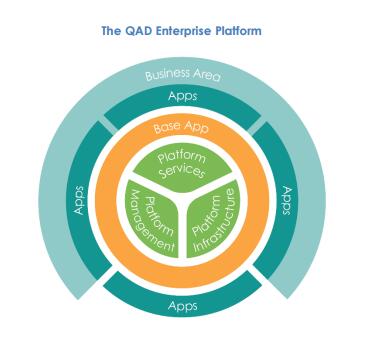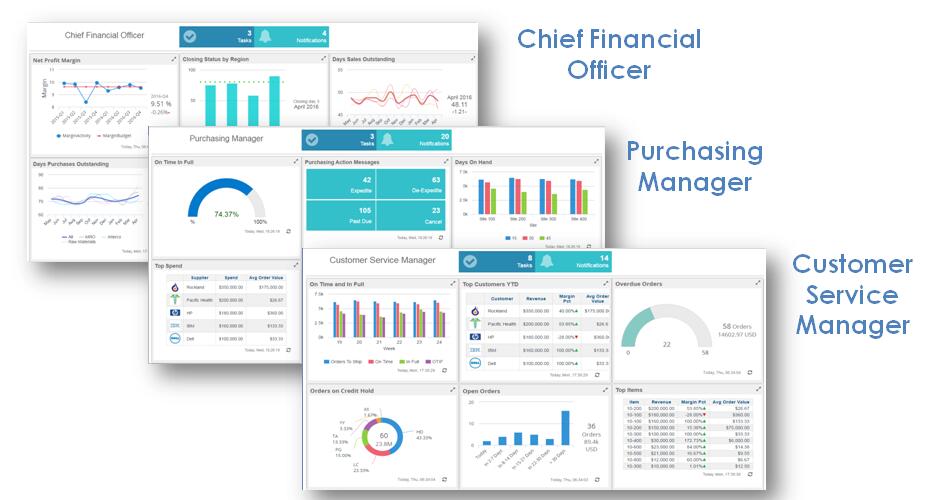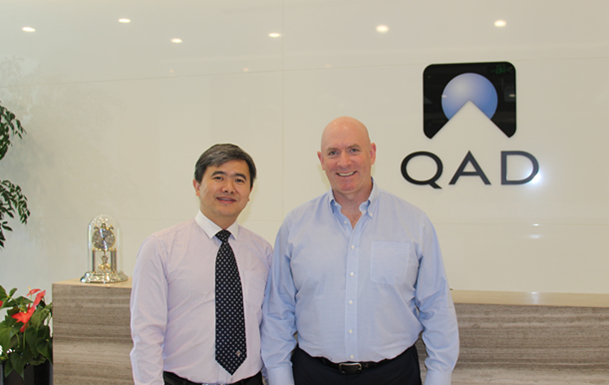QAD: Keeping focused in the waves of transformation
Currently, the waves of smart manufacturing are sweeping across the world. Digital transformation becomes a key focus point in different manufacturers around the globe. As a global industrial software provider with a history of nearly 40 years, how will QAD embrace the opportunities brought by the waves? How will QAD realize transformation and development for itself in the fierce market competition? With these questions, Dr. Pei Huang, e-works CEO interviewed Mr. Anton Chilton, QAD Chief and Global Field Operation. Anton analyzed the influence of transformation on manufacturing and software industry and shared QAD’s latest development in technology and business. Mr. Jay Cao, QAD Greater China Vice President joined the interview.

Mr. Anton Chilton, QAD Chief, Global Field Operation
Manufacturing and Software under the waves of transformation
With the upsurge of Industry 4.0, advanced technologies like Internet of Things, artificial intelligence, and machine learning are in a full swing these years. Anton believes that with more and more manufacturers start to embrace the Industry 4.0 they will realize the digital transformation in next few years.
He pointed out that the paste of change like autonomous vehicle and new energy technology will change the nature of automotive industry dramatically in the next 5-10 years and internal combustion engines will get out of the market in the future. Compared to 5 years ago, digital transformation companies looking at more integrated cloud applications than point solutions. This requires software industry to adapt to requirements quickly and offer more choice of deployment for customers. However, many large projects often take years to run. This traditional model cannot be able to rapidly respond to industry changes. Customers always expect their software to roll out fast and can respond to changes. In recent years, QAD’s transformation to cloud makes it an industry pioneer and wins a more favorable position in competition. Relying on more flexible and cost-effective solutions, QAD have acquired many large organization customers globally.
According to Anton, in the last few years QAD’s focus is cloud ERP business. They are converting customers from on-premise to cloud which means from revenue perspective, moving from license sales at big chunks of money to a steady growth of subscription. That has made QAD look flat for the couple of years. Now on the one hand, QAD is converting more and more customers, on the other hand they are also starting to look at more and more new business. Their cloud business continues to grow at least 35% every year. Now QAD has 23,000 cloud ERP users from 170 different customers in over 30 countries. In the near future of 2 to 3 years, their goal is to be able to be platform independent and select the most appropriate environment for customers based on the customers, locations, and specific needs. Geographically, QAD’s cloud business grows very aggressively in US market, which is followed by Europe, some parts of Asia Pacific, and Australia.
Continuous improvement help building the effective enterprise
As a professional management software provider focusing on manufacturing industry, QAD always highly values customer experience and keeps bringing different industry requirements into their solutions. By doing so, they can both be closer to customers and make solutions more aligned and flexible. For QAD, it also encourages the continuous improvement and innovation, further completing their vision of building the effective enterprise.
Anton introduced QAD’s recent big improvements:
1. According to some statistics that about 75% of ERP customers require some of customization to their applications for some unique differences in their business. In May this year, QAD announced the QAD Enterprise Platform at Explore 2017. The platform is developed for customers’ unique business model and process. It allows customers to create different apps include security, menus, screen, templates, collaboration, attachments, globalization and embed analytics. The platform supports app users on desktops/tablets and mobile devices. With this platform, customers can create apps in days instead of months and eliminate the need for costly customizations in the future.

QAD Enterprise Platform
2. QAD continues with “Channel Islands” initiative. It is a User Experience (UX) program started from 2014. Channel Islands program is designed to make QAD ERP solution a powerful enterprise-level management solution with strong adaptability. It is role-based, easy-to-use, and fully web enabled for every function, which can hugely improve the customer user experience. It allows QAD customers to access the ERP from anywhere from any device and get access to personalized dashboards that are very easy to set up with all the information they need. Users have all information needed to manage the day-to-day tasks, make decisions on a single dashboard that can then drill down into the relevant part in their businesses.

Different role-based dashboards
3. The third area is embedded analytics, which is offered through cooperating with its partner. This is more dashboards in terms of business performance and business house, which are embedded in applications that part of user interface. Users can drill down into what’s happening in business.
Cultivating sub-verticals, making collaborative innovation with customers
Since the first day of setting up, QAD has been focusing on providing the effective enterprise solutions for manufacturers. The six focusing industries of automotive, consumer goods, food and beverage, high tech, industrial and life sciences are divided into 24 sub-verticals for which QAD provides specific solutions and has strong supports. The focus and professionalism makes QAD gain competitive advantages in these verticals and good popularity from customers.
Recently there have been many activities in automotive industry driven by consolidation, mergers and acquisitions. Customers are also ready for connected vehicle and autonomous vehicle. That demands a higher level of refined management especially quality management for automotive enterprises. Right now QAD has a huge amount of automotive project in that space. Life sciences is also a key sector for QAD. It is being very busy with consolidation activities and emerging startups recently. Life sciences in general needs to comply with restrict regulations so there are complicated application requirements in the industry. Besides, there is always funding available for good startups, so it’s always a good business and a buoyant segment for QAD. In industrial segment, it is a mixed picture. The reduction in oil price put huge pressure on customers that supply into that industry. Vaults, seals and all the kinds of products used in oil production, those customers were tough. But now it’s starting to come back. The civil engineering and construction were also tough but investment of infrastructure in North America right now will give them more positive thinking. QAD’s Food and beverage business in Australia is reasonably healthy right now. Hi-tech electronics is steady for QAD. Relying on the deep focus in manufacturing segments, QAD keeps moving forward in the complicated and competitive management software market.
Taking advantage of the transformation to support Chinese market
In 1990s when QAD first started in China, it was QAD’s overseas customer coming into China to setup low cost manufacturing operations. Now it is revolving into the other way. Many strong Chinese companies start to go overseas. With the deep understanding and rich experience in operations in all different regions of the world, QAD is very happy to help Chinese customers go global and build cost effective plants.
With the advance of Made in China 2025 initiative, more and more Chinese manufacturers are pursuing for digital transformation and digital manufacturing. QAD is already working with partners around predictive maintenance to build up capability to consult in many use case of digital transformation. QAD will also look into leveraging the internet of things and machine learning to help customers transform their business. On the other side, the use of QAD supply chain planning product will take account of picking up information from points in the supply chain. Just in July this year, QAD released the new version of QAD DCSP (Demand and Supply Chain Planning). The latest version offers simplified Chinese and has real-time memory database. It is a complete solution with specific capabilities and powerful algorithms for Demand Planning, Distribution Planning, Production Planning, Procurement Planning, Sales & Operations Planning (S&OP) and Network and Inventory Optimization. It is very fast for scenario planning and budgeting around all tasks of supply chain operations and can compare different statistical methods in real time. QAD QMS (quality management system) can better satisfy global compliance and customer requirements with automated process reducing manual error and real-time dashboards reports helping make more accurate decisions. Besides, QAD’s is able to help more customers through open product and APIs. Anton said that, “we are very focused on making sure that our software is agile, responsive, and easy to change to reflect to rapidly evolving requirements from customers. QAD is in good shape to help Chinese companies to get ready for the digital transformation”.
Mr. Jay Cao, General Manager of QAD Greater China said that, last two years QAD’s overall business in China is being growing largely in terms of license, services, and maintenance. QAD has the key competitive advantage in certain industries like auto components. Now the Chinese team is working on medical devices. He is very positive about the growth in Chinese life science market.

Mr. Anton Chilton (right) and Dr. Pei Huang (left)
Chinese version of this article: http://www.e-works.net.cn/interview/leader_847.htm








